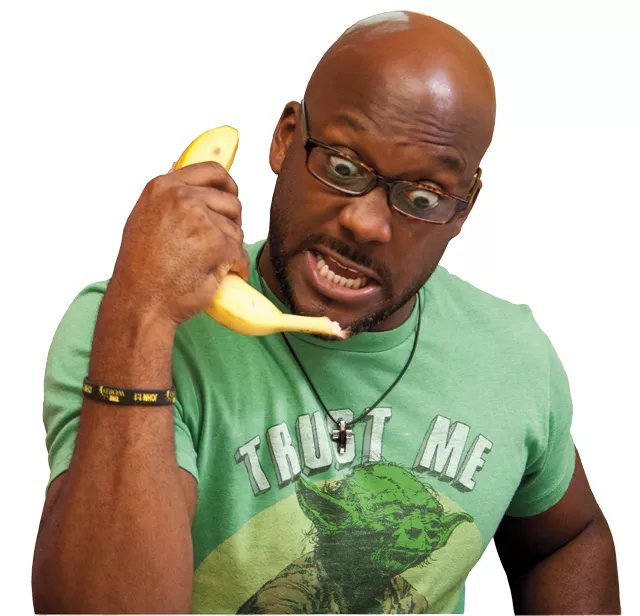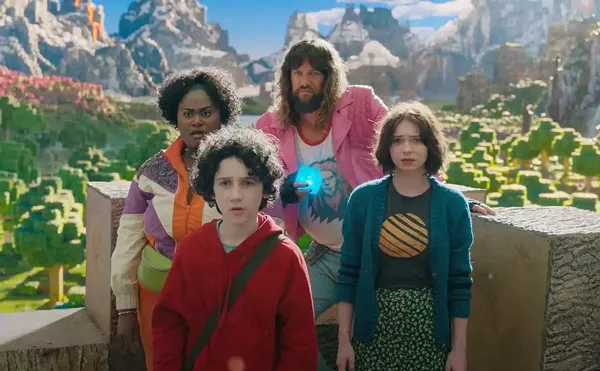
The art of comedy isn't actually funny. For most comedians, it's serious business.
Think of it as a complex equation that never yields the same answer twice, and "funny" is usually measured by how hard the audience laughed — but even that is subjective.
Why we laugh, and what we laugh at, is as much a mystery as the greatest of mysteries (choose any), and there's not one all-purpose formula to call on for that most visceral of reactions: the laugh.
No, it's not something that can be cooked up in a laboratory, or taught in a university, though you will find hundreds of classes, seminars, workshops and books on how to deliver the funny to an audience. It's an art form that requires some talent, lots of perseverance and, perhaps, most of all, honesty. We know a good joke when we hear one, and the best jokes are imbued with, at the very least, the ring of truth. We know a good comedian by what they reveal to us, how they make us laugh, how they illuminate human nature, critique our absurdities, and examine the tiny microcosms we wrap ourselves in every day.
While there isn't one reliable formula to tickle the masses, there are some basic guidelines that might make you a funnier human being.
David Dyer, Mike Green, Michael McDaniel, J Chris Newberg and Simply Shanell are five working comedians at the top of their game. Collectively, they have all had national or international exposure, from writing for Jimmy Fallon to appearances on Comedy Central, comedy clubs across the country, opening for major comics such as Lewis Black and Drew Carey, and they all hail from metro Detroit. Above all else, they each have something important to say about the art of comedy, the science of comedy, the comedy of comedy.
They're not guaranteeing a riotous response at that next open-mic night, but a little advice never hurt anyone. And no, you shouldn't quit your day job — no matter how funny your mother says you are.
David Dyer
"How do you get them to laugh?"
The "left turn," I reply.
It's all in the left turn.
You lead the audience down a path, and just before they think they know where you're going, you take a left and you keep taking lefts.
That's what a joke is. It's taking a familiar situation and approaching it from a different angle so you end up somewhere else. Most of us love to be surprised, and that surprise doesn't have to come in the format of a traditional joke. It could be part of a story or a movie.
Why is The Usual Suspects such a great flick?
Because for 106 minutes, you kind of think you have it figured out, and then in the last two minutes, you're tossed on your ear.
For me, there's nothing better than making a person laugh. We live in some pretty rough times right now, especially in Michigan, and for many, there's not a lot to smile about. I've been doing stand-up for 19 years, and I will tell you that my greatest satisfaction still comes from knowing that there's somebody in the crowd who had a rough week. That person decided to come out to the show and, for an hour, I had the privilege of being their escape so they could forget about all that other crap.
I'm a married guy with two daughters and I do a fair amount of material about the three women who surround me.
An example of the "left turn" comes in the form of a joke I used to do about my youngest daughter. It goes like this:
There's no love like the love you have for your child, but let's be honest ... there's the other side. I've never been so angry with a human being in my life ... my 6-year-old owes me money. And I feel bad shaking her down about it because ... she's 6. The only source of income she has right now is her teeth. She keeps telling me, "This one's starting to wiggle. Give me another week." "That's what you said last time," I say. A week later, I'll have her pushed up against a wall going, "Bite the apple. Daddy needs his money."
For more information, see daviddyercomedy.com or follow @dyercomedy on Twitter.
J Chris Newberg
Comedy is like music.
Jokes or funny stories all have rhythm, beats and melodies. They also have dynamics and a hook. That said, being funny is an interesting thought. It's the one form of art where not everyone will think you're successful. In fact, you could tell a joke to two people and one might like it, one might hate it and they would both be right. Comedy is subjective.
Some people are obviously funnier than others and some people will never be funny. I am funny. It's my job. I'm good at it. It evens out though, because I suck at golf.
My best advice if you are going to tell a joke is to commit. Go big or underplay it. No middle. If you believe it is funny, then it is, and if you're good enough at believing it, you might fool someone else into thinking the same. Good luck, don't stay in school. Quit your day job.
Follow @thechrisarmy on Twitter or see thechrisarmy.com.
Michael McDaniel
Being funny is being yourself.
It's the unique perspective of the individual who has the "gift of comedy." Dave Chappelle said that comedians are born, not made. I agree with that. You can only try to be someone you're not. That's no fun! Nor is it funny!
Telling a joke has to seem like you're not telling a joke.
Telling a joke is outthinking your audience. You have to take them on a journey that seems opposite of where they believe you are going. For instance: "I just found out I'm going to be a father." Good news, right? Audience claps because they are happy for you! "... on Facebook." This shocks the audience. Then you add to it, "I deleted her as a friend ... I ain't poking nobody else!" The basic anatomy of a joke is setup, punch, then tag-twist. The series above is a display of this anatomy.
Follow @IamMcDaniel on Twitter to stay up-to-date on future performances, or see IamMcDaniel.com.
Mike Green
I have used my sense of humor as a defense mechanism my whole life, and if I think something is funny, beware, because I will beat it into the ground until someone laughs. My kids hate it when I goof around with them 'cause they don't find me funny, so I will not stop until they laugh or go to their room.
My best example of when not to be funny happened in court when the judge told me: "Mr. Green, someone is hit by a drunk driver every minute in this country." I said, "We better find out who this guy is ..."
In high school, I had a teacher who reprimanded me for eating a snack in class. He said if I didn't have enough for everybody, I couldn't have it in class. That was all well and good, until he introduced his wife to us a month or so later, and I told him, "If you don't have enough for everybody ..."
My advice is to understand that just because something is funny doesn't mean it's the right time to say it. I can do my act, the same act, two different ways: clean enough for my grandma or priest, or dirty enough for drunk twentysomethings to enjoy.
I think that comes from doing so many shows in so many different places.
I have worked on the altar of a church, in a church rec hall, and countless country clubs. Conversely, I have performed in a strip bar, a nudist resort and a gay bar.
Bottom line: Know your audience.
For updates on the latest news, see oreoman.com.
Simply Shanell
I believe that anyone can be funny. However, not everyone can be a comedian.
Being a comedian is more than being funny. Comedians are a combination of storyteller, keynote speaker, therapist, friend, political analyst and motivational speaker, while keeping it funny, entertaining and thought-provoking. Comedians ... we're healers. We make people feel good.
I can't tell you the number of times after a performance that people come up to me to tell me how much they needed "to laugh," and to thank me for making them laugh.
I once read: "Comedy is the truth exaggerated."
With that said, many comedians don't like to touch on subjects of religion, politics, etc. But in my performance, I love including politics ("America found Saddam in a hole in the ground, but can't find my babydaddy to get my back child support."), religion ("You think Jesus ever told Mary, 'I can't wait to go live with my real daddy'?"), and social issues ("I live within a gated community in Detroit; everyone on my block has bars on their windows.").
I believe that comedians have a responsibility to be funny and express a point of view without preaching. Finding a platform that fits your style of comedy is the toughest part of comedy.
I find that Christian and family-friendly comedy works best for my style of comedy. It allows me to perform for audiences that include both grandchildren and grandparents. Working as a clean, Christian comic also challenges my creativity. I focus more on subject matter. I don't have the luxury of falling back on a cuss word, or inappropriate subject matter to get a laugh.
Working as a clean comedian also affords me the opportunity to be seen by individuals who would have never considered hiring a comedian to perform at their parents' 50th anniversary gala. Working clean has given me the opportunity to produce comedy show fundraisers for several metro Detroit churches and nonprofit organizations such as the AARP and the Red Hat Society.
Contact Simply Shanell at simplyshanell@yahoo.com. She plays the Clean Side of Comedy on Oct. 6, at the Millennium Center in Southfield, with headliner Jonathon Slocumb; ticket info at cleansideofcomedy.com.
Cornelius A. Fortune resisted the urge to mention Sigmund Freud's 1905 rib-splitter The Joke and Its Relation to the Unconscious. His editor couldn't. Send comments to letters@metrotimes.com.






